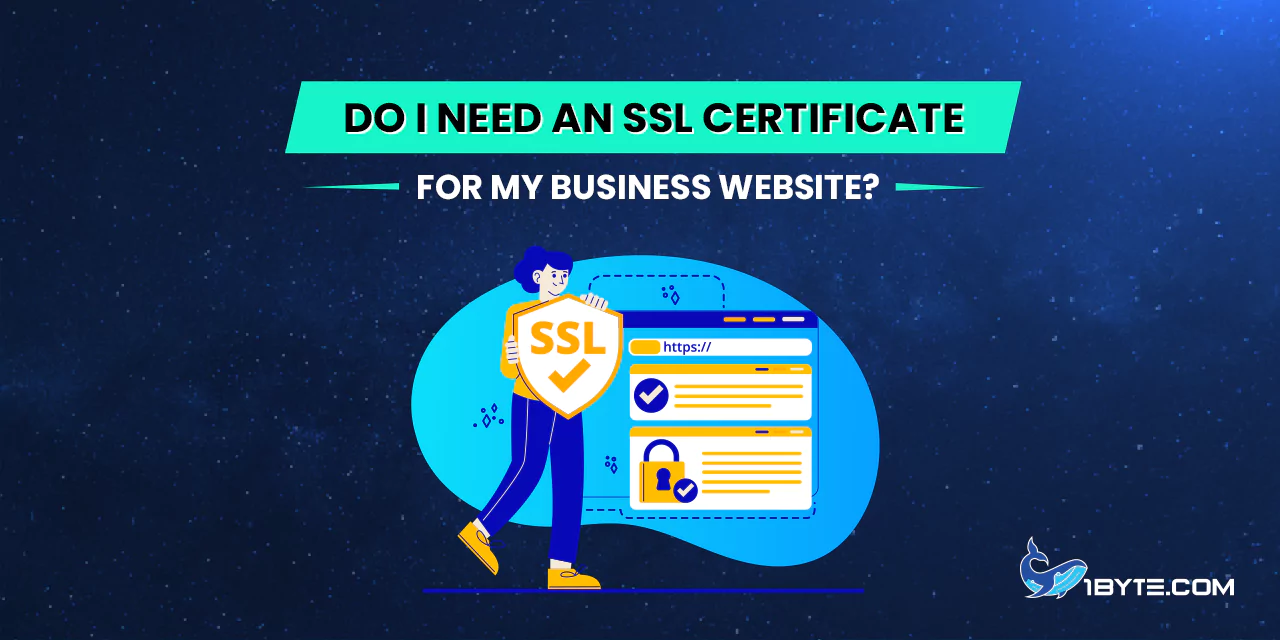In modern day, online security is essential. Statistics have shown that more than 60% of internet users avoid visiting websites without SSL certificates. So, if you ask, “do I need a ssl certificate for my business website?”, the answer from us at 1Byte is a resounding yes. SSL (Secure Sockets Layer) certificates encrypt information, so data is transmitted securely between your user’s browser and your website. If you don’t have an SSL certificate your site might even be flagged as ‘Not Secure’ by browsers like Chrome and Firefox, which could be putting off visitors. SSL is also a Google ranking factor, which means you risk poor SEO if you don’t use it. For example, an e-commerce site without SSL will lose customer’s trust and face data breach. SSL certificate protects your sensitive information and increases your site credibility.
What is an SSL Certificate?
SSL stands for Secure Sockets Layer and is the standard security technology that establishes a secured encrypted link to transfer information between a web server and a browser. Secure Sockets Layer or SSL is a security protocol to create an encrypted link between a web server and web browser. These encryptions guarantee that the information pleaded between users and websites does not get compromised.
Over 317 million SSL certificates were found on the internet in 2024, and have become commonplace. SSL certificates are highly important as it protects sensitive information such as login credentials, payment details and personal data. They also verify whether or not a website is real which prevents phishing attacks.
For example, when you visit a site secured by an SSL certificate, it should also show a padlock icon in its address bar, where you can see the connection is secured. This also helps to build trust with visitors and can help boost your website search engine ranking.
FURTHER READING: |
| 1. How to Secure a Domain Name: 7 Essential Steps |
| 2. How to Fix SSL Error: A Step-by-Step Guide |
| 3. SSL Handshake Failed: A Step-by-Step Troubleshooting Guide |
How it works (encryption, data protection)
An SSL certificate is used to encrypt data that passes between a user’s browser and your website. The encryption guarantees that sensitive information (such as credit card numbers and personal details) remains safe.

An SSL certificate establishes a secure connection between your website and its visitors, which is identified by the presence of “https” and a padlock icon in the browser’s address bar whenever a visitor visits your site. This keeps hackers from intercepting and reading the data as the secured connection is used.
They also help verify that your site is who it claims to be, which can help you build trust in your visitors. This is a verification process to ensure that your website is legit, not a fake site to steal your information, which is carried out by a Certificate Authority (CA).
As of 2024, 96% of browsing time on Google Chrome was done on HTTPS pages and you can read why SSL certificates are so important to security and search engine ranking here. Furthermore, SSL certificates even facilitate businesses to align with data protection laws such as GDPR, therefore making the user data more secure.
An SSL certificate provides not only your business data protection but also trust for your customers, and allows you to increase your search engine ranking of your website.
Benefits of Having an SSL Certificate
In today’s digital age, every business needs to have an SSL certificate for business website. SSL certificates allow you to send data securely, protecting your sensitive information like passwords and payment information.
Improved Security
An SSL certificate will boost the security of your business website immensely. An SSL certificate encrypts the data being sent between your website and its users so that information like login credentials, payment details and other personal data never fall into the hands of cybercriminals. SSL data transmission over the internet is quickly becoming a standard security technique as documented in a Fortinet report.
In addition, SSL certificates ward off man in the middle attacks which see attackers intercept traffic between two parties and tamper with it. It is also important for maintaining user data integrity and confidentiality. According to SSL Pulse, 36.3% of the websites lacked adequate security measures, proving how important running SSL correctly really is.
Businesses can, in fact, improve their search engine rankings by using an SSL certificate. Enabling HTTPS for your website can result in better ranking by Google and in higher visibility and traffic. It is also especially vital for the businesses that are intending to convey more prospects and build their presence on the internet.
In summary, obtaining an SSL certificate secures your site, builds user trust and improves your SEO. An SSL certificate is precisely the kind of investment that every business with the intention of creating a secure and reliable online experience for its customers should make.
Trust and Credibility
Having an SSL certificate for your business website is crucial for building trust and credibility with your customers. SSL certificates allow data to be encrypted ensuring the security of sensitive information such as personal details and payment information. This gives the user the re-assurance that their data is safe and that is what shows up as the padlock in the address bar where the CRC encryption is visible.
According to recent statistics 96 percent of Chrome browsing time is spent on secure HTTPS pages. In other words, having an SSL certificate on your website makes it much easier for the users to trust you and also engage with your website. Also, secure websites are prioritized in search engines like Google which could improve your website’s ranking and get more traffic to your website.
The global certificate authority market is projected to reach $282 million by 2028, rising at a compound annual growth rate (CAGR) from 2019 to 2028, according to a report by MarketsandMarkets. The importance of SSL certificates is reflected in the growth of the use of SSL certificates.
One good example is how e-commerce giant Amazon uses SSL certificates to protect customer data. It has helped build the giant’s reputation as a trustworthy site. Likewise, small businesses can secure their own SSL certificates to build security credibility and customer trust.
SEO Advantages
Securing an SSL Certificate for your business website has many SEO benefits. HTTPS is now a ranking signal for Google. SSL certificates are known to increase traffic for websites that rank higher in search results. SSL.com reports that Chrome now loads over 89% of pages using HTTPS. That means if you don’t have an SSL certificate, your website could be at a disadvantage.

Also, data exchanged between the server and the browser will be encrypted using HTTPS which prevents sensitive information from being intercepted by malicious actors. Because of this encryption, visitors can see the familiar padlock icon in the address bar that tells them they’re visiting a site with a secure connection. Netcraft conducted a study that shows that 94.3% of SSL certificates are DV (Domain Validation), the easiest to obtain type of SSL certificate but with no less security benefits.
It is additionally important for HTTPS to avoid keyword sniffing by Internet Service Providers (ISPs) and visitors of public Wi-Fi, so that search queries and other sensitive info are kept safe. It is in line with Google’s advice to Web sites to encrypt all of their traffic. Consequently, browsers can label websites not managed with HTTPS as ‘not secure,’ leading to diminished credibility and hindering user visits.
To sum up, an SSL certificate not only makes your site more secure, but also more SEO friendly, which in turn helps you gain higher rankings in search engines, and greater trust from visitors.
Compliance with Regulations
Having an SSL certificate is obligatory if you want to stay at the cutting edge of data protection laws. A case in point is the GDPR, which requires that personal data should be secured by SSL. Non compliance comes with heavy fines. SSL certificates help businesses avoid penalties as well as meet regulatory requirements, according to a report by Little Forest.
Furthermore, SSL Certificates are necessary for PCI DSS Compliance (Payment Card Industry Data Security Standard), and it is crucial for any firm dealing with credit card transactions. 94.3 percent of SSL certificates are Domain Validation (DV) certificates, the most prevalent type that is used to meet these compliance standards.
Moreover, SSL certificates also get us visual trust indicators such as the web browser’s padlock icon which tells web visitors the data s/he submitted is safe. Simply put, it builds trust and credibility, according to SSL Renewals.
Ensuring compliance of these regulations does not only save businesses from legal problems but also boost their reputation and customer trust.
Risks of Not Having an SSL Certificate
Today, in the age of the internet, security is very important. There are still a staggering 36.3 percent of websites that aren’t equipped with proper security measures to prevent cyber attacks. Without an SSL certificate, your business website is an easy target for hackers to expose that sensitive customer data. Data breaches, loss of customer trust, even legal consequences, all of these are possible due to this. In 2019, cybercrimes cost businesses more than $3.5 billion, according to the FBI’s Internet Crime Complaint Center. Additionally, unsecured websites are marked as unsafe by the very search engines people use to find them such as Google and this can damage your SEO rankings as well as push away potential customers. You do not want your website to be part of these statistics, then you need to get your website secure with an SSL certificate.
Security Vulnerabilities
Having no SSL certificate leaves your business website vulnerable to many different security flaws. In this case, hackers can intercept data sent from your website to its users, resulting in data breaches.
SSL Pulse showed that 36.3% of the websites it scanned were lacking security in 2023. This (issue) involves incomplete certificate chains and weak ciphers. If you do not have an SSL certificate, your website is more vulnerable to man in the middle attacks whereby an attacker may intercept and change the data.
In addition, according to Google Chrome, 96% of the browsing time is on HTTPS pages. That layout also means having an SSL certificate can be a negative factor on your search engine ranking (SERP) and the user’s trust of your website.
It is therefore important to have an SSL certificate in order to make sure that your website remains safe. And this will encrypt data, protect user information, and basically create trust for your website.
Loss of Customer Trust
Losing an SSL certificate will cost loss in customer trust. Something as simple as seeing a warning message about an insecure connection immediately leads visitors out of the site. SSL Pulse says that 36.3% of websites are insecure, so customers would not get attracted to it.
In addition, the results of a survey by GlobalSign show that 84% of online shoppers shy away from unsecured websites. Therefore businesses will certainly lose a huge part of their consumer base unless they have an SSL certificate.
Take, for instance, Ericsson in 2018, when a lapsed SSL certificate caused what was one of their biggest outages leading to loss of customer trust and tens of millions of dollars in losses. What this incident shows is that it’s important to keep your SSL certificates up to date so that you don’t end up in this situation.
In conclusion, SSL certificates play a key role in the trust of customers, as well as the safety of online transactions. Without it businesses may lose their customers and damage their reputation.
Negative SEO Impact
Having an SSL certificate is very important and it can severely hurt your SEO if you don’t have one. It’s been officially confirmed by Google that HTTPS is also a ranking signal. Websites without SSL certificates generally tend to be marked as insecure and therefore have lower search engine rankings. It can lead to less organic traffic and poor visibility.
Web sites without SSL certificates are more exposed to data breaches – reports a Techfunnel report. Confidential information can easily be accessed by hackers leading to a loss of customer trust. Users may be less inclined to stay on a site they perceive as unsafe and that could worsen the bounce rates, as a result of this loss of trust.
In addition to these security concerns, search engines such as Google show warning messages to visitors to unsecured sites. As these warnings appear, they will deter users from visiting your site, further affecting your SEO. In the SSL Dragon study, poorly secured sites take up 36.3%. The lack of security on this can badly affect your brand reputation, and eventually drive down customer engagement, which will negatively affect your business.
If you don’t have an SSL certificate, it can have a negative impact on your SEO as well as user trust and also your website’s performance as a whole. To escape the negative impacts, it is really important to secure your site with an SSL certificate.
Regulatory Penalties
Failure to have an SSL certificate can result in great regulatory penalties. Take, for example, websites that don’t have SSL certificates and they’re often flagged as insecure in browsers such as Google Chrome. If it’s going to fall, it’s going to fall hard — ultimately dropping search engine results rankings and therefore your online visibility, too.

In addition, regulatory bodies including the General Data Protection Regulation (GDPR) in Europe have made huge fines compulsory for organisations that do not adhere to data protection standards. Businesses could receive fines as high as €20 million if customer data was not well protected, such as in the case of British Airways.
Furthermore, the Payment Card Industry Data Security Standard (PCI DSS) mandates that all credit card handling businesses avail themselves of an SSL certificate. If you do not comply with them, you can be fined, sued, or lose the trust of your customer.
To sum it up, no SSL certificate would put all of your website’s security at risk, which means it’s possible to lose your business to regulatory penalties and financial losses.
Leverage 1Byte’s strong cloud computing expertise to boost your business in a big way
1Byte provides complete domain registration services that include dedicated support staff, educated customer care, reasonable costs, as well as a domain price search tool.
Elevate your online security with 1Byte's SSL Service. Unparalleled protection, seamless integration, and peace of mind for your digital journey.
No matter the cloud server package you pick, you can rely on 1Byte for dependability, privacy, security, and a stress-free experience that is essential for successful businesses.
Choosing us as your shared hosting provider allows you to get excellent value for your money while enjoying the same level of quality and functionality as more expensive options.
Through highly flexible programs, 1Byte's cutting-edge cloud hosting gives great solutions to small and medium-sized businesses faster, more securely, and at reduced costs.
Stay ahead of the competition with 1Byte's innovative WordPress hosting services. Our feature-rich plans and unmatched reliability ensure your website stands out and delivers an unforgettable user experience.
As an official AWS Partner, one of our primary responsibilities is to assist businesses in modernizing their operations and make the most of their journeys to the cloud with AWS.
Conclusion
At 1Byte, we’ve always known the importance of online security. So, “do I need an SSL certificate for my business website?” Absolutely, you do! With over 317 million SSL certificates detected on the internet as of August 2024, businesses everywhere are recognizing the critical need to protect their online presence.

